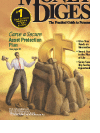Publication
Article
Physician's Money Digest
PRN: Focus on the Corporation
Author(s):
Just as we take parts of our economicsystem for granted, like moneyand banks, most of us don't oftenthink about that defining Americaninstitution, the corporation. We workin them and for them, invest in them,and use their products, which reachinto every intimate corner of our lives.Yet, what are their identifying characteristics,those that have molded ourlives and our modern economic world?
CORPORATE BIRTH
For most of recorded history, humanity'seconomic life outside of governmentrevolved around what we nowcall the solo proprietorship and thesmall partnership. These were sufficientfor our means, if not our needs. Thencame the age of exploration and theIndustrial Revolution, which explodedour world of possibilities but demonstratedthe lack of organizational vehiclesfor our new possibilities.
In short, we got to be too big for oureconomic britches and turned to thegovernment for help. So a new entitywas politically contrived to raise capitalfor our big ideas by selling many smallshares in the new enterprises. To makethem safer and therefore easier to sell,the new "virtual person" known as thecompany was allowed to have liabilitylimited only to the assets in the corporationand not extendable into shareholders'pockets. This was big.
Still, the idea didn't burgeon untilthe advent of the railroad, with its limitlessappetite for more and more capital.This gave us the economic engine topush the industrial engine, which hasonly gathered more and more steam inthe past 150 years.
GLUTTONOUS PROBLEMS
But just as humans have feet of clay,so do our creations. In the wake of theeconomic success of the companycame pollution, human exploitation,and conflict between the involved constituencies,including owners, the newmanager class, workers, consumers,and government.
As in so much of human enterprise,the Law of Unintended Consequencesreared its ugly head. Turns out the raw,unrestrained pursuit of profit is notpretty. Allowances have to be made forspeculation, abuse of power, corruption,fraud, and all manners of humanpeccadillo. Ergo the origin of the laborunions and governmental regulation ofthe worst abuses, which continue to berefined to this very day as conditions ofchange warrant.
UNEASY RELATIONSHIP
For these reasons, Americans havealways been ambivalent about "theselittle republics" as Robert Lowe, theBritish "Father of the Corporation,"called them. We admire the results ofthese virtual entities, but often not themeans. And as John Micklewait pointsout in his nifty little The Company(Modern Library; 2003), with the adventof corporate social responsibility, laborunions, governmental regulation, therecord improvement in the materialquality of our lives, and, let's face it, corporatepublic relations, we've easedinto an uneasy, long-term relationshipwith our corporate world.
But will the next step into the Age ofMultinationals prove the corporations'undoing, or will it be a springboard to afurther evolution of our economicdevelopment? Responsible to no 1 governmentor any restraining constituency,will their ultimate lack of transparencylead to accelerating globalismor a backlash? Either way, where shouldwe invest our hard-saved money in theearly 21st century? Ay, there's the rub.
Jeff Brown, a partner on theStanford Graduate School ofBusiness Alumni ConsultingTeam, teaches in the StanfordSchool of Medicine FamilyPractice Program. He welcomes questionsor comments at jeffebrownmd@aol.com.
